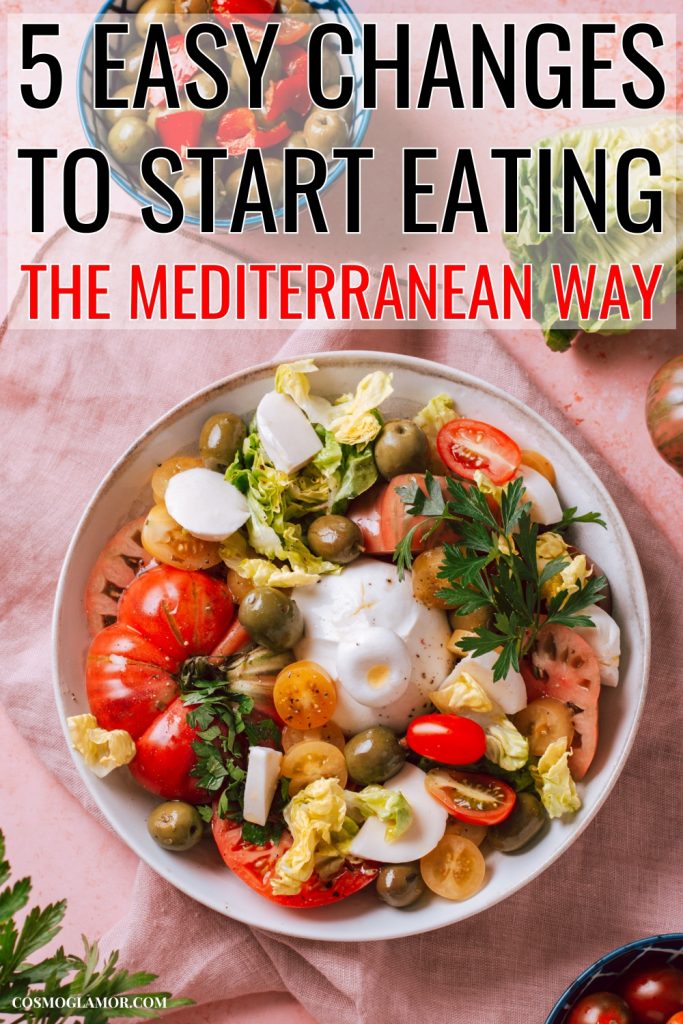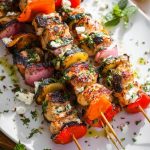Let's be honest. The “Mediterranean Diet” often conjures up images of idyllic coastal living and leisurely meals under the sun. It sounds amazing, but also… a little unattainable, right? Like you need to relocate to a Greek island and become a professional olive farmer to reap the benefits.
But here's the secret: you don't need a complete lifestyle overhaul to eat a little more… Mediterranean. You don't need to import exotic ingredients or learn a new culinary language. It's about making small, sustainable swaps. I started this journey a few years ago, transitioning from a diet heavy on processed foods to one focused on whole, Mediterranean-inspired ingredients. My first attempts weren't always perfect (my early hummus experiments were… interesting), but I learned along the way.
So, how do you “Mediterraneanize” your diet without turning your kitchen upside down? Here are five easy steps you can start with today.
1. Become a Plant-Based Pro (It's Easier Than You Think!)

The core of the Mediterranean diet is plants. Not just a sad side salad, but a vibrant celebration of fruits, vegetables, legumes, and whole grains. Think colorful, flavorful, and satisfying.
- The Strategy: Aim to make fruits and vegetables at least half of every meal. It sounds like a lot, but it's totally doable with a few simple strategies.
- Easy Swaps:
- Breakfast: Add berries to your oatmeal, or throw some spinach into your scrambled eggs.
- Lunch: Pack a big salad with lots of colorful veggies, or add extra lettuce, tomato, and cucumber to your sandwich.
- Dinner: Make stir-fries, roasted vegetable medleys, or hearty vegetable soups.
- Snacks: Instead of chips, reach for cut vegetables and hummus, or a piece of fruit.
Pro Tip: Keep a bowl of fruit on your counter. Seeing it will remind you to snack on it!
2. Go Whole Grain (Your Gut Will Thank You)

This one's simple: swap your refined grains (white bread, white rice, regular pasta) for whole grains (whole-wheat bread, brown rice, whole-wheat pasta, quinoa, farro).
- The Science-y Bit: Whole grains contain the entire grain kernel – the bran, germ, and endosperm – providing more fiber, vitamins, and minerals than refined grains.
- Easy Swaps:
- Bread: Choose 100% whole-wheat bread instead of white bread. (Check the ingredient list – “whole wheat” should be the first ingredient.)
- Rice: Brown rice, wild rice, or quinoa instead of white rice.
- Pasta: Whole-wheat pasta instead of regular pasta.
- Breakfast: Switch that sugary cereal for old-fashioned oats or whole-grain options.
Pro Tip: If you're new to whole grains, start slowly. Mix half brown rice with half white rice, or half whole-wheat pasta with half regular pasta. Your taste buds will adjust!
3. Embrace the Olive Oil Life (But Mindfully)

Olive oil is central to the Mediterranean diet. But we're focusing on extra virgin olive oil (EVOO), the highest quality, with the most flavor and health benefits.
- The Difference: EVOO is made from the first pressing of the olives and is minimally processed, preserving its antioxidants and healthy monounsaturated fats.
- How to Use It:
- Cooking: Use EVOO for sautéing, roasting, and baking (at moderate temperatures).
- Dressing: Make your own salad dressings with EVOO, vinegar or lemon juice, and herbs.
- Finishing: Drizzle a little EVOO over cooked dishes for extra flavor.
Pro Tip: Store your EVOO in a cool, dark place, away from direct sunlight and heat. This helps preserve its flavor and beneficial compounds. A dark-colored bottle also helps protect it from light.
4. Rethink Your Protein (Fish is Your Friend!)

The Mediterranean diet emphasizes fish and poultry over red meat. It's about rebalancing your protein intake, not eliminating meat altogether.
- The Goal: Aim for fish or seafood at least 2-3 times a week. Fatty fish like salmon, tuna, and sardines are especially beneficial due to their omega-3 fatty acids (important for brain and heart health!).
- Easy Swaps:
- Taco Tuesday? Use fish or shrimp instead of beef.
- Burger night? Try turkey burgers or veggie burgers.
- Pasta night? Add some canned tuna or salmon to your sauce.
Pro Tip: Canned fish is a great pantry staple – it's affordable, convenient, and just as nutritious as fresh fish.
5. Spice It Up! (And Add a Squeeze of Citrus!)

Mediterranean cuisine is all about flavor. And a lot of that flavor comes from herbs, spices, and a secret weapon: citrus!
- Herbs and Spices: These add incredible depth and complexity to dishes, without adding extra salt, sugar, or unhealthy fats. Experiment with oregano, basil, rosemary, thyme, garlic, cumin, paprika, and more.
- Citrus Power: Lemon and lime juice (and even the zest!) add brightness and acidity to dishes, enhancing other flavors and reducing the need for salt.
Pro Tip: Try this simple Italian herb blend: Mix equal parts dried oregano, basil, and garlic powder. Use it on everything from roasted vegetables to grilled chicken.
Sample Mediterranean Meal Plan (One Day)

- Breakfast: Greek yogurt with berries, a drizzle of honey, and a sprinkle of chopped walnuts.
- Lunch: Large salad with mixed greens, chickpeas, chopped vegetables (cucumber, tomato, bell pepper), feta cheese, and a lemon-herb vinaigrette (made with EVOO, lemon juice, oregano, and garlic).
- Dinner: Baked salmon with roasted asparagus and a side of quinoa.
- Snack: A small handful of almonds and an apple.
Beyond the Plate: The Mediterranean Lifestyle

It's important to remember that the Mediterranean diet is more than just what you eat. It's also about how you eat.
- Mindful Eating: Pay attention to your food. Savor each bite. Eat slowly and without distractions (put away your phone!).
- Shared Meals: Whenever possible, eat with others. Meals are a time for connection and conversation.
- Portion Control: While the Mediterranean diet is full of healthy foods, portion sizes still matter. Be mindful of how much you're eating.
The Mediterranean approach is about a holistic lifestyle. It’s less about rigid rules, and more about adopting a more balanced, enjoyable, and healthful way of living.
The Takeaway (It's a Delicious Journey)
“Mediterraneanizing” your diet isn't about perfection; it's about progress. It's about making small, sustainable changes that add up over time. Start with one or two of these tips, and gradually incorporate more as you become comfortable. It’s about finding joy in cooking and sharing delicious, wholesome food. And if you occasionally stumble? That's okay! Just get back on track with your next meal. The Mediterranean way is a journey, not a race.





